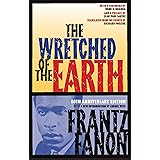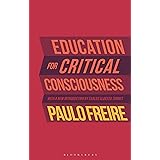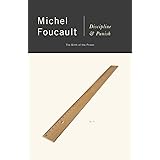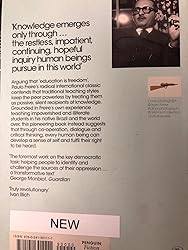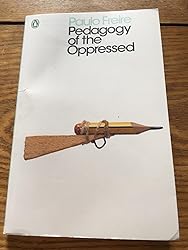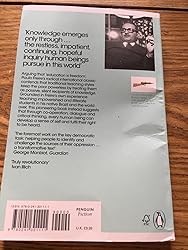
Download the free Kindle app and start reading Kindle books instantly on your smartphone, tablet, or computer - no Kindle device required.
Read instantly on your browser with Kindle for Web.
Using your mobile phone camera - scan the code below and download the Kindle app.

OK
Pedagogy of the Oppressed Paperback – January 1, 1974
There is a newer edition of this item:
- Print length186 pages
- LanguageEnglish
- PublisherThe Seabury Press
- Publication dateJanuary 1, 1974
- ISBN-100816491321
- ISBN-13978-0816491322
The Amazon Book Review
Book recommendations, author interviews, editors' picks, and more. Read it now.
Similar items that may ship from close to you
Product details
- ASIN : B000O5S91S
- Publisher : The Seabury Press; 15th edition (January 1, 1974)
- Language : English
- Paperback : 186 pages
- ISBN-10 : 0816491321
- ISBN-13 : 978-0816491322
- Item Weight : 8 ounces
- Best Sellers Rank: #2,853,182 in Books (See Top 100 in Books)
- #17,546 in Foreign Language Reference
- Customer Reviews:
About the author

Discover more of the author’s books, see similar authors, read author blogs and more
Customer reviews
Customer Reviews, including Product Star Ratings help customers to learn more about the product and decide whether it is the right product for them.
To calculate the overall star rating and percentage breakdown by star, we don’t use a simple average. Instead, our system considers things like how recent a review is and if the reviewer bought the item on Amazon. It also analyzed reviews to verify trustworthiness.
Learn more how customers reviews work on AmazonReviews with images
-
Top reviews
Top reviews from the United States
There was a problem filtering reviews right now. Please try again later.
I was tempted to take off a star or two for what other readers have mentioned-- that his writing is incredibly pedantic. But I guess that's to be expected; this is a scientific deconstruction of oppression and the role of revolutionary education. I would recommend this book to all-- especially young-- educators (I am one). We need to question WHY we teach what we teach, and what kind of world we want students to create-- Paulo Friere gives a brilliant, though slow, examination of these questions.
Top reviews from other countries
What we do not want is that teachers who teach passive entities and fill it in the students like bank deposits under the impression that the students consider the piece of knowledge as true. The intention is that they get more passive and that they will adapt easier in the world as it is. This concept is contrarily to the concept of liberation and emancipation. It is a kind of oppression. The dialogical approach is beneficial for both the teacher and the student. In the educational process arguments based on authority can no longer be valid and accepted. Authority must be on the side of freedom and not against it (p. 53). Through dialogue with teacher-student and student-teacher the participants become jointly responsible for the educational process. They learn from the teacher and get taught teaching. Both will grow in this process, being mediated by the world and their cognizable objects.
Their responses to new challenges will follow by new understandings. This is the education of freedom and of liberation. This is as well problem posing education. The task is to demythologizing and de-alienation the facts in the world. The dialog is indispensable to get the real concept of the world and to unveil the reality. This kind of education makes the students critical thinkers. The intention is to give the people their ontological and historical vocation of becoming more fully human (p. 57).
The real situation is the beginning to determine the perception of it and the move from it. The situation must be perceived as authentical and merely limited but not fated. Then the situation might be challenging but as well changeable. The deepening of the consciousness of the situation leads to the understanding that this is a historical reality which is object of transformation. The true dialogue requires the critical thinkers. The critical thinker perceives the reality as process as a continuing transformation of reality with the objective to the humanization of men.
The historical themes are never isolated. They are always interacting dialectically with their opposites. Often myth-creating irrationality threatens and only be critical and dynamic view of the world the reality can be unveiled and transformed in the favor of the liberation of the people and the humanization of the mankind (p. 75).
Humans are in the dialectical situation between the determination of limits and their own freedom. To overcome the limit-situation men must separate the world from their own actions. Men must perceive their decisions as independently from the boundaries of the world. Their decisions are evolving from the relationship from themselves to the world and from the relationship to others. The historical consciousness leads to this transcendental power enabling to respond to the unlimited challenges. The historical themes can only be found in the human-world relationships. These themes constitute the epochal achievement in a dialectical kind of development. The themes and concepts are with opposites and the compete against each other. The outcome is a result of a complex of opposing interacting of human beings.
When the limit-situation is not clearly perceived, the actions will not be authentical historical actions. In this situation, humans are unable to transcend the limit-situations to discover the realm of the “untested feasibility” or the sphere of the unperceived practicable solutions. The present consciousness prevents the perceiving the "untested feasibility" which lies beyond the limit-situations. To go deeper in the concept the reader should look into Lucien Goldman's concept of potential consciousness and real or present consciousness. To achieve the potential consciousness men must perform the "testing action" and discover the new feasibility and not yet proved feasibility. This requires the investigation of meaningful themes.
The educators or investigators or leaders can play the role of acceleration by projection of a clear and simple codification of an existential situation. The research on the successful codification indicates that if a first codification is found that is essential, means a basic nucleus of truth has been perceives and this opens into a thematic extension with many following codifications. After the decoding of the essential situation is the projected image can be taken as a reference for further auxiliary codifications. The participants are enabled to reach a synthesis.
The untested feasibility will be discovered in the process of critical thinking, dialogue, and actions, accompanied by failures and rectifications. Human beings learn to swim in the water, not in a library. If there is a leader, a facilitator, a coach, or an investigator the process will be more effective and get more power to the social movement in the direction of epochal improvement.





